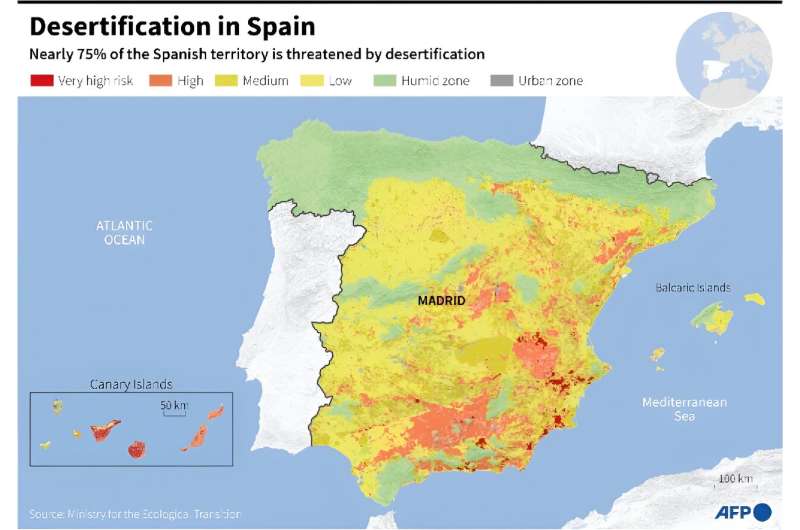
Ongoing droughts and an over-exploitation of land for both agriculture and industry have stoked fears in Spain over the creeping spread of “sterile soil” which could devastate Europe’s kitchen garden.
“Spain is not going to be a desert with dunes like in the Sahara, that’s morphologically impossible,” explains del Barrio, a researcher at EEZA, the experimental center for research into arid zones.
But desertification, which is characterized by a severe “degradation of the soil” causing it to lose its productive capacity, “is worrying”, he says.
In the dock are the usual suspects: global warming, which is driving rising temperatures leading to water evaporation that causes more wildfires, but also human activity, which is the biggest culprit, notably due to intensive farming.
Despite its very dry climate, Almeria has transformed itself into Europe’s vegetable garden through its 40,000 hectares of greenhouses—its “Sea of Plastic”—which produce thousands of tons of tomatoes, peppers, courgettes and cucumbers all year round.
But these vast crop-producing areas are exacerbating the problem by using groundwater and “depleting the aquifers,” says del Barrio.
According to the UN Convention to Combat Desertification, 75 percent of Spain’s land is battling climatic conditions that could lead to desertification, making it the European nation most threatened by the problem.
“This puts us in a complicated position in which the combination of extreme temperatures, droughts and other factors aggravate the risk of erosion and the loss of soil quality,” Spain’s Ecology Minister Teresa Ribera warned in June.
According to the Spanish National Research Council (CSIC), to which EEZA reports, soil degradation has tripled over the last 10 years, creating a problem which is “irreversible on a human scale”.
And that means soils which are unable to retain water or organic matter, that cannot support crops or nourish livestock—which is a matter of huge concern in a country where agriculture accounts for annual exports of some 60 billion euros ($66 billion).
“Soil erosion is now the main problem for most farmers in Spain,” said UPA, which represents small farmers and stockbreeders, warning the situation was “serious” and could have a significant “economic cost”.